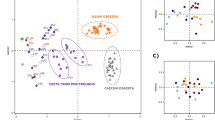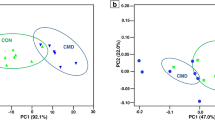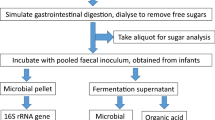Abstract
MICROBIAL fermentation in the rumen was early recognized as the primary source of vitamin B12 for the cow1. Rumen contents contain not only the vitamin itself but also certain analogues in which the nucleotide portion of the vitamin is missing or modified by the substitution of a different benzimidazole or a purine for the base (5 : 6-dimethylbenzimidazole). In general, the analogues containing nucleotides with benzimidazole derivatives tend to possess some vitamin activity for animals while those containing purines tend to have activity only for micro-organisms2. The relative activities vary with different micro-organisms and even with the particular assay technique used3. In rumen contents, vitamin B12 itself makes up about 10 per cent of the activity for Escherichia coli, factor A (containing 2-methyl adenine) composes about 60 per cent, while pseudo-vitamin B12 (containing adenine), factor B (containing no nucleotide) and factor C (containing guanine) account for most of the remainder4. Relatively little work has been reported in regard to the part played in the synthesis of these compounds by the individual species of micro-organisms obtained from the rumen and in general such studies have not included true or functional rumen organisms5.
This is a preview of subscription content, access via your institution
Access options
Subscribe to this journal
Receive 51 print issues and online access
$199.00 per year
only $3.90 per issue
Buy this article
- Purchase on Springer Link
- Instant access to full article PDF
Prices may be subject to local taxes which are calculated during checkout
Similar content being viewed by others
References
Kon, S. K., and Porter, J. W. G., Proc. Nutr. Soc., 12, xii (1953).
Smith, E. L., Vitamin B12 (Methuen and Co., Ltd., London, 1960).
Ford, J. E., Nature, 171, 149 (1953).
Kon, S. K., and Porter, J. W. G., Vitamins and Hormones, 12, 53 (1954).
Gall, L. S., and Huhtanen, C. N., J. Dairy Sci., 34, 353 (1951). Pfiffner, J. J., Calkins, D. G., Peterson, R. C., Bird, O. D., McGlohon, V., and Stipek, R. W., Abstr. Papers, 120th Meeting, Amer. Chem. Soc., 22, C (1951). Porter, J. W. G., and Dollar, A. M., Abstr. Commun., Fourth Intern. Biochem. Congr., Vienna, Sect. 8, 96 (1958).
Bryant, M. P., Bact. Rev., 23, 125 (1959).
Bryant, M. P., and Robinson, I. M., App. Microbiol., 9, 91 (1961).
Harrison, E., Lees, K. A., and Wood, F., Analyst, 76, 696 (1951).
Burkholder, P. R., Science, 114, 459 (1951).
Ford, J. E., and Holdsworth, E. S., Biochem. J., 53, xxii (1953).
Ford, J. E., Brit. J. Nutr., 7, 299 (1953).
Lichtenstein, H., Beloian, A., and Murphy, E. W., U.S. Dep. Agric. Home Econ. Res. Rep., No. 13 (1961).
Stadtman, E. R., Overath, P., Eggerer, H., and Lynen, F., Biochem. Biophys. Res. Commun., 2, 1 (1960).
Author information
Authors and Affiliations
Rights and permissions
About this article
Cite this article
DRYDEN, L., HARTMAN, A., BRYANT, M. et al. Production of Vitamin B12 and Vitamin B12 Analogues by Pure Cultures of Ruminal Bacteria. Nature 195, 201–202 (1962). https://doi.org/10.1038/195201b0
Issue Date:
DOI: https://doi.org/10.1038/195201b0
This article is cited by
-
Can perfluoroalkyl acids biodegrade in the rumen simulation technique (RUSITEC)?
Environmental Sciences Europe (2015)
Comments
By submitting a comment you agree to abide by our Terms and Community Guidelines. If you find something abusive or that does not comply with our terms or guidelines please flag it as inappropriate.



